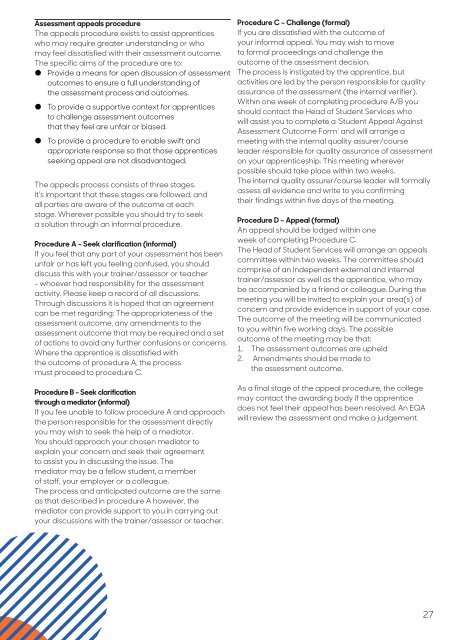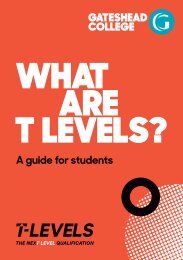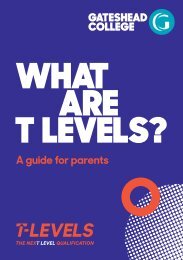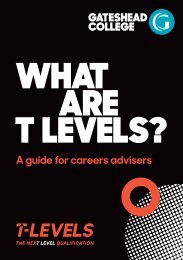Apprenticeship Handbook 2023/24
You also want an ePaper? Increase the reach of your titles
YUMPU automatically turns print PDFs into web optimized ePapers that Google loves.
Assessment appeals procedure<br />
The appeals procedure exists to assist apprentices<br />
who may require greater understanding or who<br />
may feel dissatisfied with their assessment outcome.<br />
The specific aims of the procedure are to:<br />
● Provide a means for open discussion of assessment<br />
outcomes to ensure a full understanding of<br />
the assessment process and outcomes.<br />
●<br />
●<br />
To provide a supportive context for apprentices<br />
to challenge assessment outcomes<br />
that they feel are unfair or biased.<br />
To provide a procedure to enable swift and<br />
appropriate response so that those apprentices<br />
seeking appeal are not disadvantaged.<br />
The appeals process consists of three stages.<br />
It’s important that these stages are followed, and<br />
all parties are aware of the outcome at each<br />
stage. Wherever possible you should try to seek<br />
a solution through an informal procedure.<br />
Procedure A – Seek clarification (informal)<br />
If you feel that any part of your assessment has been<br />
unfair or has left you feeling confused, you should<br />
discuss this with your trainer/assessor or teacher<br />
- whoever had responsibility for the assessment<br />
activity. Please keep a record of all discussions.<br />
Through discussions it is hoped that an agreement<br />
can be met regarding: The appropriateness of the<br />
assessment outcome, any amendments to the<br />
assessment outcome that may be required and a set<br />
of actions to avoid any further confusions or concerns.<br />
Where the apprentice is dissatisfied with<br />
the outcome of procedure A, the process<br />
must proceed to procedure C.<br />
Procedure B – Seek clarification<br />
through a mediator (informal)<br />
If you fee unable to follow procedure A and approach<br />
the person responsible for the assessment directly<br />
you may wish to seek the help of a mediator.<br />
You should approach your chosen mediator to<br />
explain your concern and seek their agreement<br />
to assist you in discussing the issue. The<br />
mediator may be a fellow student, a member<br />
of staff, your employer or a colleague.<br />
The process and anticipated outcome are the same<br />
as that described in procedure A however, the<br />
mediator can provide support to you in carrying out<br />
your discussions with the trainer/assessor or teacher.<br />
Procedure C – Challenge (formal)<br />
If you are dissatisfied with the outcome of<br />
your informal appeal. You may wish to move<br />
to formal proceedings and challenge the<br />
outcome of the assessment decision.<br />
The process is instigated by the apprentice, but<br />
activities are led by the person responsible for quality<br />
assurance of the assessment (the internal verifier).<br />
Within one week of completing procedure A/B you<br />
should contact the Head of Student Services who<br />
will assist you to complete a ‘Student Appeal Against<br />
Assessment Outcome Form’ and will arrange a<br />
meeting with the internal quality assurer/course<br />
leader responsible for quality assurance of assessment<br />
on your apprenticeship. This meeting wherever<br />
possible should take place within two weeks.<br />
The internal quality assurer/course leader will formally<br />
assess all evidence and write to you confirming<br />
their findings within five days of the meeting.<br />
Procedure D – Appeal (formal)<br />
An appeal should be lodged within one<br />
week of completing Procedure C.<br />
The Head of Student Services will arrange an appeals<br />
committee within two weeks. The committee should<br />
comprise of an Independent external and internal<br />
trainer/assessor as well as the apprentice, who may<br />
be accompanied by a friend or colleague. During the<br />
meeting you will be invited to explain your area(s) of<br />
concern and provide evidence in support of your case.<br />
The outcome of the meeting will be communicated<br />
to you within five working days. The possible<br />
outcome of the meeting may be that:<br />
1. The assessment outcomes are upheld<br />
2. Amendments should be made to<br />
the assessment outcome.<br />
As a final stage of the appeal procedure, the college<br />
may contact the awarding body if the apprentice<br />
does not feel their appeal has been resolved. An EQA<br />
will review the assessment and make a judgement.<br />
27

















